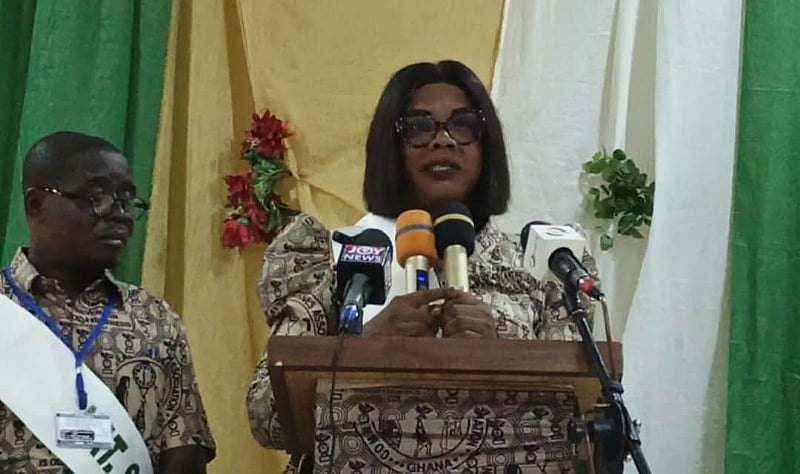Community Health Nurses (CHNs) in Ghana, the backbone of the nation’s primary healthcare system, particularly in underserved rural communities, have voiced their concerns regarding inadequate working conditions and insufficient incentives, hindering their ability to deliver effective healthcare services. These concerns were brought to the forefront during the National Special Delegates Conference held in Sunyani, themed “Welfare and Condition of the Community Health Nurse in the CHPS Programme: Achieving Quality Universal Health Coverage.” The conference served as a platform for CHNs to articulate their challenges and advocate for improved support to effectively contribute to Ghana’s pursuit of universal health coverage. The CHNs, operating primarily under the Community-Based Health Planning and Services (CHPS) initiative, a crucial program for bringing healthcare closer to communities, emphasized the critical link between their welfare and their capacity to provide quality care.
Central to the CHNs’ grievances is the lack of adequate resources and support, significantly impacting their ability to perform their duties effectively. Esther Frimpomaa Bamfo, National President of the Community Health Nurses Association Ghana (CoHNAG), highlighted several key issues affecting their members, including delayed promotions, which demoralize and undermine career progression; insufficient logistics, such as essential medical supplies and transportation, which hamper their ability to reach remote communities and provide necessary care; and poor accommodation, often lacking basic amenities, making it difficult for CHNs to maintain a comfortable and healthy living environment, especially in remote postings. These challenges, according to Ms. Bamfo, create a sense of neglect and frustration among CHNs, impacting their morale and ultimately, the quality of healthcare delivered to communities.
Beyond the material challenges, Ms. Bamfo also expressed deep concern over the perceived neglect by the Ghana Health Service (GHS) towards CHNs, particularly during times of personal hardship. She lamented the lack of support provided to CHNs facing health crises or accidents, highlighting a perceived disconnect between the GHS and the frontline workers who are integral to the healthcare system. This sense of abandonment, she argued, is not only demoralizing but also raises questions about the GHS’s commitment to the well-being of its workforce. The lack of support during personal difficulties, she emphasized, further underscores the need for improved welfare packages and a more empathetic approach from the GHS towards the challenges faced by CHNs.
In response to the concerns raised by the CHNs, Dr. Prince Quarshie, Bono Region Deputy Director of Public Health, acknowledged the legitimacy of the challenges and assured the nurses that steps were being taken to address them. He recognized the significant sacrifices made by CHNs, particularly those serving in remote and underserved areas, and emphasized the GHS’s understanding of the link between their welfare and the attainment of universal health coverage. Dr. Quarshie outlined the GHS’s commitment to improving the working conditions of CHNs, promising actionable steps to enhance their welfare, including better incentives and improved resource allocation. This acknowledgment, while welcomed by the CHNs, underscores the need for concrete action and transparent implementation of promised improvements.
Further reinforcing the government’s commitment to addressing the CHNs’ concerns, Bono Regional Minister Joseph Addae Akwaboa pledged to engage with stakeholders to ensure a conducive working environment and the timely provision of incentives. He commended the dedication and crucial role of CHNs in providing healthcare at the grassroots level, recognizing their contribution to the overall health and well-being of communities, particularly in areas with limited access to healthcare facilities. Mr. Akwaboa’s pledge, while encouraging, highlights the need for collaborative efforts between the government, the GHS, and CHN representatives to develop sustainable solutions to the persistent challenges.
The conference concluded with a sense of cautious optimism amongst the CHNs. While welcoming the assurances from government and GHS representatives, they remain expectant of tangible changes in their working conditions and welfare packages. Achieving universal health coverage, a national priority for Ghana, hinges on the effectiveness and motivation of frontline healthcare workers like CHNs. The key question remains whether these assurances will translate into concrete improvements in the lives and working conditions of these dedicated healthcare professionals, ultimately strengthening the healthcare system and ensuring equitable access to quality care for all Ghanaians. The CHNs’ continued dedication and commitment to their communities underscore the urgent need for action to address their concerns and ensure a sustainable and thriving healthcare system.














